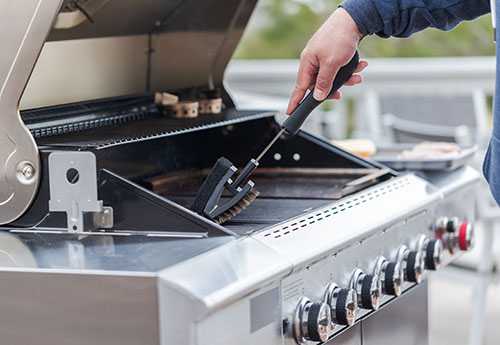Fall Grill Cleaning
Oct 23, 2023

As the cool air of late fall rolls in, it’s almost time to say goodbye to the outdoor grilling season. Before you store your grill away for the winter, however, it’s crucial to give it some much-needed attention. Proper fall cleaning not only preserves the life of your grill but also ensures that it’s ready to fire back up when spring arrives.
Keep reading for helpful tips on why cleaning your grill is important and the best ways to tackle the task.
The first step to winterizing your grill involves understanding why it is so important. Cleaning your grill before winter serves several purposes:
Before cleaning your grill, you will want to gather the necessary cleaning supplies including a stiff wire brush, warm water, a scrubbing sponge or cloth, a bucket, dish soap, disposable gloves, trash bags, and a grill cover. Once you have what you need, follow these steps to get your grill ready for winter:
With just these few simple steps, you can ensure your grill is in prime condition when the warm weather returns. Your local Co-op has a wide selection of grilling and maintenance supplies for winterizing your equipment. Find the nearest store location here.
For more content like this, check out the latest issue of The Cooperator.
Keep reading for helpful tips on why cleaning your grill is important and the best ways to tackle the task.
The first step to winterizing your grill involves understanding why it is so important. Cleaning your grill before winter serves several purposes:
- Prevents rust: Exposure to cold and wet weather can cause grills to quickly develop rust and corrosion. Regular cleaning and maintenance help protect the metal surfaces from these elements.
- Prolongs the lifespan: A grill that is well-maintained will last much longer than a grill that is not. Therefore, by taking the time to properly clean it in the fall, you are investing in your grill’s longevity.
- Removes food residue: Leftover food, grease, and residue can attract rodents and insects, turning your grill into a winter hideout for them. Cleaning your grill will minimize the risk of unwanted pests.
- Saves time and effort in the spring: A thoroughly cleaned grill is easier to prepare and use when the warm weather returns. You’ll be ready to grill without the need for extensive spring cleaning.
Before cleaning your grill, you will want to gather the necessary cleaning supplies including a stiff wire brush, warm water, a scrubbing sponge or cloth, a bucket, dish soap, disposable gloves, trash bags, and a grill cover. Once you have what you need, follow these steps to get your grill ready for winter:
- Empty the grill: Start by removing the grates and any other removable parts from the grill. This includes the drip pan, heat deflectors, and flavorizer bars. Empty and discard any leftover charcoal or wood chips. If you use a propane or natural gas grill, disconnect the tank and store it in a safe place.
- Scrape the grates: Use a stiff wire grill brush to thoroughly scrub the grates and remove any burnt-on residue, grease, and food particles. Make sure to brush both sides of the grates. If the grates are coated with a non-stick surface, handle them gently to avoid damaging the coating.
- Wash the removable parts: Fill a bucket with warm, soapy water and scrub the parts that you removed earlier such as the drip pan, heat deflectors, and flavorizer bars. Rinse them thoroughly and allow them to dry completely before reassembling the parts.
- Clean the interior: Using a scrubbing sponge or cloth, clean the interior of the grill, paying special attention to any stubborn stains, grease buildup, or debris. If necessary, use a degreaser to help break down stubborn grime. Once finished, rinse the interior to remove any cleaning residue.
- Cover and protect: If you have a grill cover, use it to protect your grill from the elements. If not, find a dry, sheltered location to store your grill for the winter. Just make sure the space is well-ventilated and away from sources of moisture.
- Maintain your grill: While your grill hibernates through the winter, periodically check on it to ensure it remains clean and dry. Remove any accumulating debris such as ice, snow, or leaves, and make any necessary repairs or maintenance to prevent issues from worsening over the winter.
With just these few simple steps, you can ensure your grill is in prime condition when the warm weather returns. Your local Co-op has a wide selection of grilling and maintenance supplies for winterizing your equipment. Find the nearest store location here.
For more content like this, check out the latest issue of The Cooperator.